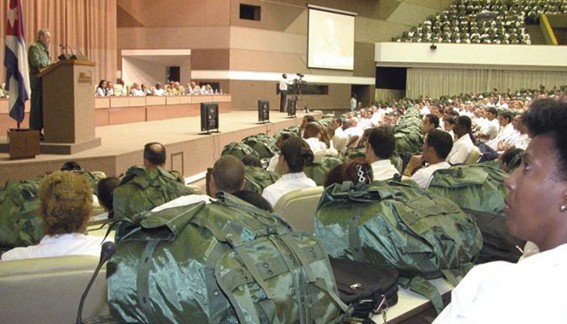
Following is a statement from the Cuban Institute of Friendship with the Peoples (ICAP), published on Aug. 22 in the institute’s newsletter, “Cuban Happenings: News of the Island and of Solidarity.” It was prepared by ICAP’s Directorate of Communication and Historical-Documentary Heritage.
Translated by Iliana García Giraldino with Siempre con Cuba.
Twenty years have passed since Hurricane Katrina’s devastating passage through the U.S. states of Louisiana, Mississippi and Alabama, and Cuba’s immediate offer to send doctors to help — without any conditions — in the dramatic situation that claimed the lives of more than 1,200 people. Fidel reiterated his offer of solidarity. The U.S. government ignored it, knowing that such assistance would save lives.
The Commander in Chief closely followed the events, insisted on the proposal, emphasized his desire to help people without seeking any publicity, and continually issued instructions.
The destructive meteorological phenomenon struck on Aug. 29, 2005, and at 11:32 a.m. the following day, the leader of the Cuban Revolution directed that a message be sent through the U.S. Interests Section in Havana and Washington. Fidel expressed condolences to the U.S. government for the hurricane and offered assistance with health care, “because we knew, from the news we were receiving, that a catastrophe was unfolding there.”
The message expressed, in light of the emergency: “We want to take a break,” alluding to the state of relations between the two countries. The objective was to send doctors and medical personnel to the affected areas and three field hospitals.
In a speech delivered days later, on Sept. 19, at a meeting with more than 1,500 doctors from the forces pledged to support the American people, the Commander in Chief stated: “(…) It was evident that the greatest danger lay with those desperate masses of poor people, among them many elderly with health problems, pregnant women, mothers and children, who were in urgent need of medical attention.”
He emphasized that Cuba offered aid, “from the very first moment, on Tuesday, Aug. 30, at 12:45 p.m., when the winds and rain had barely ceased. We do not regret it, even though our country was not even mentioned (by the U.S.) in the long list of countries that offered solidarity to the American people.”
Addressing the doctors, he said: “You, with your swift and unhesitating response, willing to fulfill your duty in new and difficult conditions, are writing a page in the history of solidarity among peoples and are showing a path to peace for the suffering and threatened human species to which we all belong.”
And Fidel emphasized: “If in the end no response comes (from the U.S. government) or your cooperation is not necessary, there will be no discouragement in our ranks — neither in you nor in us, nor in our people. Quite the contrary, we would feel satisfied to have fulfilled our duty…”
At that meeting with the doctors, the Contingent of Doctors Specialized in Disasters and Serious Epidemics emerged. At Fidel’s suggestion, it took the name “Henry Reeve” — a young New Yorker who fought for Cuban independence in the 19th Century and rose to the rank of General.
Since then, the Henry Reeve Brigade has provided its valuable services in more than 20 nations and provided assistance to millions of people in emergency situations (Ebola epidemics, earthquakes and hurricanes).
This contingent is part of the magnificent Cuban medical collaboration since the first brigade in 1963, which worked in Algeria.
Other momentous events have included the creation of the Comprehensive Health Program after Hurricanes George and Mitch hit Central America in 1998; in 2003, the Special Mission to Venezuela, the Barrio Adentro Program; and “Operation Miracle,” which restored vision to millions of people. More than 600,000 Cuban health workers have collaborated in more than 160 countries.
Faithful to Fidel’s legacy, Cuba currently maintains more than 24,000 collaborators in 56 countries. The island’s offer to help the American people after Hurricane Katrina in 2005 is remembered as one of the crucial moments in the history of solidarity of the Cuban Revolution.
(Iliana García Giraldino / Siempre con Cuba)
*Prepared by: ICAP’s Directorate of Communication and Historical-Documentary Heritage
Join the Struggle-La Lucha Telegram channel
